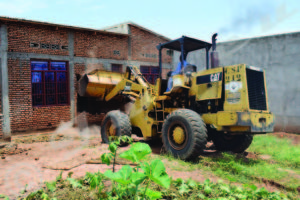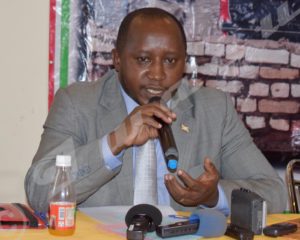Owners of 23 houses located within the perimeter of the presidential palace site did not meet the set deadline (7 April) to leave the places. The reason is that they have not been compensated. A bulldozer went into action on Tuesday, 11 April.
Written by Egide Nikiza, Christian Bigirimana and Agnès Ndirubusa. Translated by Pierre Emmanuel Ngendakumana

A bulldozer destroying one of the 23 houses in the perimeter where the occupants have to leave
Desolation could be read on the faces of the inhabitants of Gasenyi I of Mutimbuzi commune in Bujumbura province, this Tuesday, 11 April. Nadine Gacuti, Provincial Governor, accompanied by an army of police officers, executed the measure to evict the 23 households occupying the houses built in the 40 ha of the site of the presidential palace in Gasenyi. She said the administration had previously held consultations with the concerned persons before the demolition. “This is a project of common interest.
The population understands its importance. That’s why there have not been any clashes. “ Mrs. Gacuti said she understood the emotion of the inhabitants of this locality. She asked them to exercise restraint while waiting for a distribution of other plots in Maramvya area. ”Trust me. I will do my best so that you can have other plots. The government will not fail to give plots of land to 23 households. “She invited those who have no lodgings to go to the office of Mutimbuzi commune.
Guests carrying an offensive message
The concerned Gasenyi inhabitants are not enthusiastic. The governor and her retinue tried to convince a certain Emmanuel Bizimana to write an act recognizing that he himself would take out his own affairs. He refused, arguing that it is as if he himself had given the order to destroy his own house: “Do you think it makes sense for me to write it? It’s you who are at work, do it. Personally, I cannot. “ He wondered why the value of constructions seemed trivial to them.”I thought you were going to carry out a valuation in order to compensate us.”
After a short discussion, he finally signed the document written by Jean Bosco Hakizimana, the chief of the area, in the presence of the governor. Without further ado, the occupants left and the order to proceed to demolition was given.
Mr. Bizimana criticizes the authorities for the destruction of his house while he has no place to shelter his family. He claims that he has not yet received compensation. “I feel desperate. It hurts to witness the destruction of your home.” He says he is not opposed to the execution of the “project of the State” but he is skeptical about compensation. “The provincial authorities are telling us that they are dealing with our case. It is hard to believe even if they represent the government. “ A woman who spoke on condition of anonymity said her departure would change the daily life of her family. Shocked, she asked the Head of State “to think about the grieving families”. She wondered whether or not her children would continue their studies.
“The governor exhorts us to go to the office of the commune. What will become of our children if we respond to her call? It would be difficult to get there because of the distance from their school. I have no choice; my children and I are going to live in the street. ”
Granting of compensations is conditioned
Emérence Ntahonkiriye, Director General of Urban Planning, says the compensation concerns only houses built before the 2009 decree on the physical delimitation of the 40 ha of the site of the presidential palace at Gasenyi. On the national radio, she stated in the evening edition of the same day that those whose buildings date from the said decree are not entitled to compensation. A bulldozer did not destroy houses completely. It broke some of the constructions to allow the owners to recover building materials after the demolition.
>>Reactions
Jean-Claude Karerwa Ndenzako: “The government has set up a commission to look into this issue” According to the spokesman for the President of the Republic, what happened in Gasenyi is sad.
 Nevertheless, he regrets that people have not respected the law: “It was strictly forbidden to erect constructions or carry out activities in this perimeter chosen for infrastructures of public interest since 2009. Despite the proscription, people turned a deaf ear. “He reassures that the government has set up a commission to look into this issue. Mr. Karerwa Ndenzako said the latter would give an answer when the time came.
Nevertheless, he regrets that people have not respected the law: “It was strictly forbidden to erect constructions or carry out activities in this perimeter chosen for infrastructures of public interest since 2009. Despite the proscription, people turned a deaf ear. “He reassures that the government has set up a commission to look into this issue. Mr. Karerwa Ndenzako said the latter would give an answer when the time came.
Léonce Ngendakumana: “The preoccupation of the government is not social cohesion”
 This deputy chairman of FRODEBU party is not surprised by the government’s decision to destroy the houses. He believes that the concerns for the current government are not the social cohesion and improvement of the citizens ‘well-being. For him, the authorities only think of keeping them in command: “That is why they take measures that go against citizens’ reconciliation.” He also said the plots would be given to the dignitaries and others sold at exorbitant prices.
This deputy chairman of FRODEBU party is not surprised by the government’s decision to destroy the houses. He believes that the concerns for the current government are not the social cohesion and improvement of the citizens ‘well-being. For him, the authorities only think of keeping them in command: “That is why they take measures that go against citizens’ reconciliation.” He also said the plots would be given to the dignitaries and others sold at exorbitant prices.
Gérard Hakizimana: “The revision of the law on property expropriation is necessary”
 For the president of the Association against nepotism and populism (FOLUCON F), what happened in Gasenyi is unfair: “People witnessed the destruction of their houses without compensation.”He said the state would have found beforehand where to shelter the families before moving to the demolition of houses. He called for the revision of the law on expropriation. “The calculation of the compensation on the basis of BIF250, 000 per year does not match with the economic situation of the country anymore.”
For the president of the Association against nepotism and populism (FOLUCON F), what happened in Gasenyi is unfair: “People witnessed the destruction of their houses without compensation.”He said the state would have found beforehand where to shelter the families before moving to the demolition of houses. He called for the revision of the law on expropriation. “The calculation of the compensation on the basis of BIF250, 000 per year does not match with the economic situation of the country anymore.”
Clarification by Emery Nukuri
The lecturer at the University of Burundi, Faculty of Law, specialist in land law, particularly in expropriation and public utility easement, speaks about the case of Gasenyi.
What are the legal provisions in force governing expropriation for public purposes?
 With regard to international law, two texts ratified by Burundi speak of the protection of private property. This is the Universal Declaration of Human Rights which, in its article 17, paragraph 2, stipulates that no one may be arbitrarily deprived of his property, that is to say that any deprivation of property must be in conformity with the law.
The second text is the African Charter on Human Rights which, in its article 14, stipulates that the right to property can be infringed only on grounds of public utility in accordance with the provisions of the appropriate laws.
With regard to international law, two texts ratified by Burundi speak of the protection of private property. This is the Universal Declaration of Human Rights which, in its article 17, paragraph 2, stipulates that no one may be arbitrarily deprived of his property, that is to say that any deprivation of property must be in conformity with the law.
The second text is the African Charter on Human Rights which, in its article 14, stipulates that the right to property can be infringed only on grounds of public utility in accordance with the provisions of the appropriate laws.
What about the internal arrangements in Burundi?
In Burundi, article 36 of the Constitution states in paragraph 2 that no person shall be deprived of his/her property except in the case of public interest and in the manner established by the law and subject to fair compensation. It’s just because when you lose ownership of your home or plot, you lose something that has a financial value. And the prerequisite means that compensation precedes clearing off.
Is there a land code in Burundi Indeed, the land code, which is in the Constitution, provides for the expropriation for public utility by the payment of a fair and prior indemnity.
Let us apply these provisions for the case of Gasenyi
Three questions arise in the case of Gasenyi. The first is whether the law provides for expropriation, no doubt that it does. The Constitution and the land code are clear.
Around the world, all states have the capacity to expropriate for the general interest. The other question is whether the expropriation is for public utility. From the outset, it is a presidential palace; the presidential palace is a public institution, so the public utility is verified. The last condition speaks of just compensation and that is where the problem arises in this case.
How?
With respect to compensation, the question is whether it was properly calculated and paid prior to expropriation. It would have been studied on a case-by-case basis to avoid controversy. According to reliable sources, some were compensated and others were not.
Beyond that, let’s talk about fair and prior compensation
The land code, in some articles, defines how
expropriation is done. When a public utility project is introduced, the audit is done. Subsequently, the decision is displayed so that those whose properties are expropriated have their rights. In the final decision, the authority must indicate the form of compensation. It can be in kind as one can give an equivalent land or to know if they will pay in cash. Section 425 specifies that the person whose property has been expropriated has the right to demand monetary compensation. So before the eviction, the authority must fix the indemnity. Article 427 states that this must be done even in an emergency.
What does the law say about the people who erect buildings after the decision of the State in this case after 2009? For those before 2009?
it is at least clear. They must have compensation for the land, buildings and other pieces of work they have done on the land. For those who built after the 2009 expropriation decision, if they were told that there would be an expropriation without compensation, one has to wonder why the local government allowed them to build. There is reason to wonder about the responsibility of the State. The state must be everywhere. It should have been consistent with either compensating them or prohibiting them from building.
How is the compensation paid?
The 2011 Ministerial Ordinance applies the 2008 rates. As a result, the calculation of the compensation is done by means of an outdated text. Rates do not correspond to the market price. Let’s give a simple example. For a field of rice, for 1kg, the compensation rate is BIF 700. For the people of Gasenyi who are in a suburban area, BIF 2500 will be given per square meter. BIF 250,000 will be paid per acre, which we know it costs approximately 1 million BIF. Legend 3: A bulldozer destroying one of the 23 houses in the perimeter where the occupants have to leave



















 IWACU Open Data
IWACU Open Data

